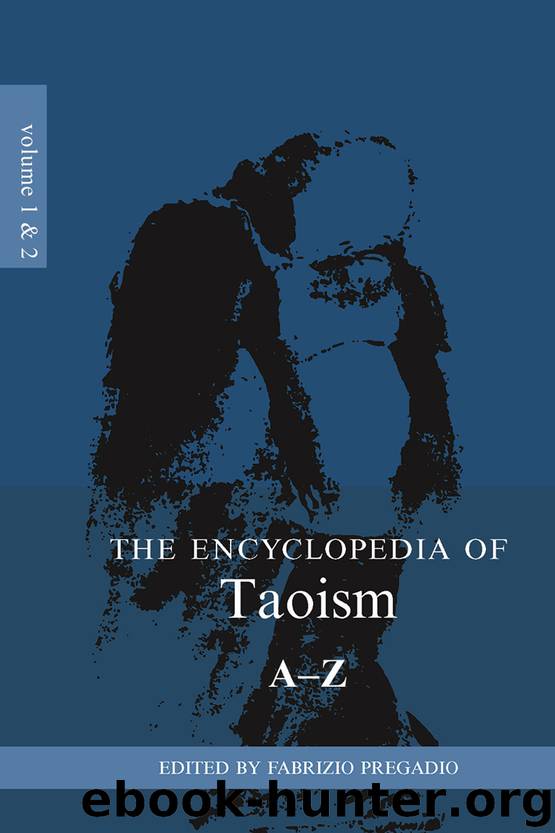The Encyclopedia of Taoism by Pregadio Fabrizio

Author:Pregadio, Fabrizio.
Language: eng
Format: epub
Publisher: Taylor & Francis (CAM)
Pan Shizheng
潘師正
585–682; zi: Zizhen 子真
Pan Shizheng, the eleventh *Shangqing patriarch or Grand Master (zongshi 宗師), was the spiritual heir of *Wang Yuanzhi, and the transmitter of Wang's authority to *Sima Chengzhen, the greatest of all Tang Taoists.
Pan's life is known from biographies in the Standard Histories (Jiu Tangshu, 192.5126; Xin Tangshu, 196.5605) and in Taoist sources (e.g., *Lishi zhenxian tidao tongjian, 25.4b–7b; *Maoshan zhi, 11.1a–2a). The standard biographies report that during the reign of Sui Yangdi (r. 604–17), Pan took ordination as a *daoshi and studied under Wang, then lived for many years as a recluse on Mount Song (*Songshan, Henan), the “Central Peak” near Luoyang. From 676 to 683, he received several visits from Tang Gaozong (r. 649–83) and Empress Wu (r. 690–705). Gaozong apparently sought to glorify himself by associating with an “honored recluse” (Kirkland 1992–93, 153–56), but as in certain other cases, the association seems to have been less substantial than the ruler wished.
The Taoist biographies report that in 676 Gaozong requested “talismans and texts” (fushu 符書), but that Pan refused. The Standard Histories do not mention this event, though we know that Tang Xuanzong (r. 712–56) later received such a transmission from Sima Chengzhen. Scholars have speculated as to why Pan would have denied Gaozong's request (e.g., Benn 1977, 49–50). On one level, the issue seems to be one of great political significance, since the conveyance of such materials had for centuries signified religious sanction of a worthy ruler (Seidel 1983a; Kirkland 1997a). If Pan did refuse Gaozong such materials, the implication would have been that Gaozong's reign was spiritually deficient. Some have suggested (Benn 1977, 50) that Pan declined because the Empress Wu was already exercising more power than was acceptable in a sanctified reign. But more innocent explanations are possible. For instance, the talismans of the Shangqing order consisted primarily of diplomas that certified a certain degree of spiritual attainment on the recipient's part. Perhaps Pan merely judged Gaozong insufficiently advanced in spiritual matters to receive such certification. Or perhaps Pan was just reluctant to involve himself in politics, like Sima's successor, *Li Hanguang (see Kirkland 1986b). It is also conceivable that the Taoist reports of the incident were merely reflections of events concerning Sima, Li or similar figures of the period.
Though no writings are attributed to Pan, the Daozang preserves a purported colloquy between him and Gaozong, the Daomen jingfa xiangcheng cixu 道門經法相承次序 (The Scriptures and Methods of Taoism in Orderly Sequence; CT 1128). Barrett (1996, 38–39) notes that the opening section summarizes basic elements of Taoist belief and practice; the conclusion constitutes a glossary of Taoist terms; and the body of the work reports Pan's answers to Gaozong's questions about the number and organization of the Taoist heavenly beings. The actual provenance of the text remains uncertain.
The standard biographies report that when Pan died in 682, both Gaozong and Empress Wu “brooded over it endlessly.” They granted Pan a noble rank, and canonized him as the Elder Who Embodies the Mystery (Tixuan xiansheng 體玄先生).
Download
This site does not store any files on its server. We only index and link to content provided by other sites. Please contact the content providers to delete copyright contents if any and email us, we'll remove relevant links or contents immediately.
The Tao of Physics by Fritjof Capra(2276)
Human Design by Chetan Parkyn(2072)
The Diamond Cutter by Geshe Michael Roach(2060)
Feng Shui by Stephen Skinner(1940)
The Alchemy of Sexual Energy by Mantak Chia(1860)
Tao Te Ching by Lao Tzu(1841)
365 Tao: Daily Meditations by Ming-Dao Deng(1621)
Tao Tantric Arts for Women by Minke de Vos(1599)
Sun Tzu's The Art of War by Giles Lionel Minford John Tzu Sun(1541)
Sidney Sheldon (1982) Master Of The Game by Sidney Sheldon(1520)
Buddhism 101 by Arnie Kozak(1512)
Karma-Yoga and Bhakti-Yoga by Swami Vivekananda(1495)
The Analects of Confucius by Burton Watson(1436)
The Art of War Other Classics of Eastern Philosophy by Sun Tzu Lao-Tzu Confucius Mencius(1428)
Tao te ching by Lao Tzu(1366)
The Way of Chuang Tzu by Thomas Merton(1364)
The New Bohemians Handbook by Justina Blakeney(1355)
The Sayings Of by Confucius(1316)
Bless This House by Donna Henes(1271)
